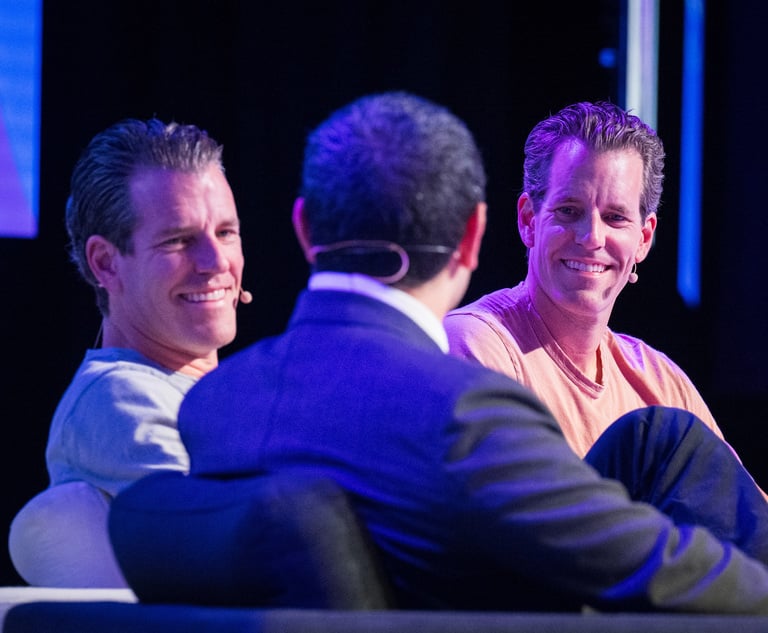 U.S. District Judge James Donato of the Northern District of California
U.S. District Judge James Donato of the Northern District of CaliforniaJudge Poised to Approve Updated $650M Facebook Settlement Over Facial Recognition
U.S. District Judge James Donato said the updated settlement seemed to address his concerns but asked attorneys to get creative to increase claims rates. The Northern District of California judge said "this could be a breakthrough moment" for developing a model for large settlements involving online entities.
July 23, 2020 at 06:41 PM
5 minute read
Facebook and lawyers for the platform's users stacked another $100 million on top of a proposed class action settlement over the social media company's use of facial recognition technology in an attempt to sway the judge to sign off on the deal.
Although the federal judge overseeing the case indicated he is likely to approve it, the additional funds weren't enough to win him over completely.
During a Zoom hearing Thursday, U.S. District Judge James Donato of the Northern District of California told counsel from Cooley and Robbins Geller Rudman & Dowd that, "You all are fond of telling me this is a record-breaking settlement, but there's no reason this can't be a record-breaking claims rate as well."
Donato of the Northern District of California has been skeptical about the $550 million settlement reached in January, which sought to resolve claims brought under Illinois' Biometric Information Privacy Act regarding Facebook's "tag suggestions" feature.
Although Facebook and plaintiffs lawyers claim the settlement is the largest class action privacy deal to date, in February, the judge asked the parties to explain why class members would get less than the $1,000 in statutory damages prescribed by the law for negligent violations. In a June 4 hearing, Donato said the settlement took "a 98.75% discount off of the amount that the Illinois legislature said might be due in this case if you proved up your case," according to a transcript reviewed by NPR.
On Wednesday, Facebook's attorneys and class counsel filed an amended stipulation of the settlement, upping the settlement fund to $650 million.
During the hearing, Paul Geller of Robbins Geller, who represents plaintiffs in the case alongside attorneys from Edelson and Labaton Sucharow, said that upping the monetary relief in the deal was a "very contentious point." Cooley's Michael Rhodes, representing Facebook, did not want the company to pay more money, he said, and with Facebook offering more money to the class, the plaintiffs attorneys decided to do the same.
In the original stipulation, plaintiffs attorneys sought attorneys fees worth 25% of the settlement fund. In the updated deal, they are seeking 20% of the original $550 million, or 16.9% of the updated deal.
"If Facebook is going to kick more money to the class, so is class counsel," Geller said.
Donato said the updated settlement appeared to address most of his concerns, but said, especially given the settlement amount, that he was concerned about how to best get word of the deal out to class members.
Gary McCoy, a Facebook product manager who runs the company's facial recognition program, testified that users will see class notices on the platform in their alerts and on their timeline that will include a link that will direct them to the settlement website, in addition to traditional methods such as email. Class members would also get the same alerts notifying them that their default is that facial recognition is turned off and would be given the option to turn it on. Additionally, the default for global Facebook users will be that they have to turn on facial recognition if they want to use it.
Donato questioned how they were going to make the notices "flashier and splashier" for users "modern eyes."
"When you're online, you get bombarded with things, and we all get used to not seeing things," he said. "When you send notices out about facial recognition practices and opt in, what are you doing to make sure people are actually seeing it?"
McCoy said they'd be using the most "aggressive methods" and relying on best practices developed by teams who "own this and do this every day." One of the best practices is to keep language simple. For instance, using the phrase "turn on" instead of "enable."
Geller said that a few plaintiffs firms, such as Lieff Cabraser Heimann & Bernstein, have been reaching out to behavioral economists who research how to make sure claims notices reach class members, a prospect that seemed to intrigue Donato.
He called the case a "perfect lab" for increasing claims rate, and suggested retaining a behavioral economist.
"This could be a breakthrough moment, I might even order it, but maybe you just think about retaining a behavioral economist or something like that," he said, noting that the case could create a model for increasing claims rates for large settlements involving online entities.
Donato ended the hearing saying that he would need to reflect more on the updated terms, since he only received the filing last night. But he said the settlement appeared to be "incrementally better than the one I turned down laser month."
This content has been archived. It is available through our partners, LexisNexis® and Bloomberg Law.
To view this content, please continue to their sites.
Not a Lexis Subscriber?
Subscribe Now
Not a Bloomberg Law Subscriber?
Subscribe Now
NOT FOR REPRINT
© 2025 ALM Global, LLC, All Rights Reserved. Request academic re-use from www.copyright.com. All other uses, submit a request to [email protected]. For more information visit Asset & Logo Licensing.
You Might Like
View All
‘Not a Regulatory Gray Area’: CFTC Secures $5M Settlement From Gemini
3 minute read
Apple Agrees to Pay $95 Million Settlement in Siri Voice Assistant Privacy Class Action

Anthropic Agrees to 'Guardrails' for Its AI Training to Protect Copyrighted Lyrics Pending Fight Over Fair Use
5 minute read
'Erroneous Assumption'?: Apple Challenges DOJ Antitrust Remedy in Google Search Monopoly Case
3 minute readLaw Firms Mentioned
Trending Stories
- 1The Appropriate Exemption in Students for Fair Admissions v. President & Fellows of Harvard College
- 2DOJ, 10 State AGs File Amended Antitrust Complaint Against RealPage and Big Landlords
- 3New Partners at Cummings & Lockwood, Carmody Torrance Sandak & Hennessey
- 4'Extra Government'?: NY Top Court Eyes Ethics Commission's Constitutionality
- 5South Texas College of Law Houston Selects New Dean
Who Got The Work
Michael G. Bongiorno, Andrew Scott Dulberg and Elizabeth E. Driscoll from Wilmer Cutler Pickering Hale and Dorr have stepped in to represent Symbotic Inc., an A.I.-enabled technology platform that focuses on increasing supply chain efficiency, and other defendants in a pending shareholder derivative lawsuit. The case, filed Oct. 2 in Massachusetts District Court by the Brown Law Firm on behalf of Stephen Austen, accuses certain officers and directors of misleading investors in regard to Symbotic's potential for margin growth by failing to disclose that the company was not equipped to timely deploy its systems or manage expenses through project delays. The case, assigned to U.S. District Judge Nathaniel M. Gorton, is 1:24-cv-12522, Austen v. Cohen et al.
Who Got The Work
Edmund Polubinski and Marie Killmond of Davis Polk & Wardwell have entered appearances for data platform software development company MongoDB and other defendants in a pending shareholder derivative lawsuit. The action, filed Oct. 7 in New York Southern District Court by the Brown Law Firm, accuses the company's directors and/or officers of falsely expressing confidence in the company’s restructuring of its sales incentive plan and downplaying the severity of decreases in its upfront commitments. The case is 1:24-cv-07594, Roy v. Ittycheria et al.
Who Got The Work
Amy O. Bruchs and Kurt F. Ellison of Michael Best & Friedrich have entered appearances for Epic Systems Corp. in a pending employment discrimination lawsuit. The suit was filed Sept. 7 in Wisconsin Western District Court by Levine Eisberner LLC and Siri & Glimstad on behalf of a project manager who claims that he was wrongfully terminated after applying for a religious exemption to the defendant's COVID-19 vaccine mandate. The case, assigned to U.S. Magistrate Judge Anita Marie Boor, is 3:24-cv-00630, Secker, Nathan v. Epic Systems Corporation.
Who Got The Work
David X. Sullivan, Thomas J. Finn and Gregory A. Hall from McCarter & English have entered appearances for Sunrun Installation Services in a pending civil rights lawsuit. The complaint was filed Sept. 4 in Connecticut District Court by attorney Robert M. Berke on behalf of former employee George Edward Steins, who was arrested and charged with employing an unregistered home improvement salesperson. The complaint alleges that had Sunrun informed the Connecticut Department of Consumer Protection that the plaintiff's employment had ended in 2017 and that he no longer held Sunrun's home improvement contractor license, he would not have been hit with charges, which were dismissed in May 2024. The case, assigned to U.S. District Judge Jeffrey A. Meyer, is 3:24-cv-01423, Steins v. Sunrun, Inc. et al.
Who Got The Work
Greenberg Traurig shareholder Joshua L. Raskin has entered an appearance for boohoo.com UK Ltd. in a pending patent infringement lawsuit. The suit, filed Sept. 3 in Texas Eastern District Court by Rozier Hardt McDonough on behalf of Alto Dynamics, asserts five patents related to an online shopping platform. The case, assigned to U.S. District Judge Rodney Gilstrap, is 2:24-cv-00719, Alto Dynamics, LLC v. boohoo.com UK Limited.
Featured Firms
Law Offices of Gary Martin Hays & Associates, P.C.
(470) 294-1674
Law Offices of Mark E. Salomone
(857) 444-6468
Smith & Hassler
(713) 739-1250






